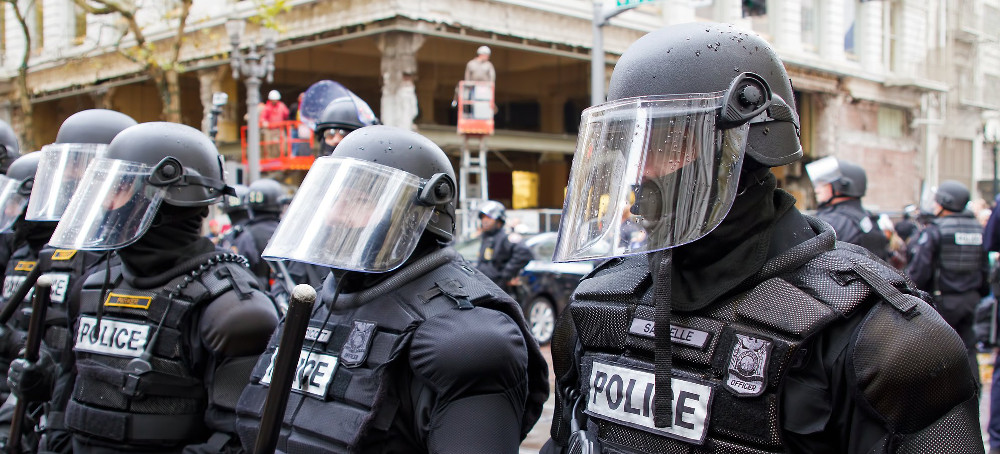ACLU, News Orgs Challenge Arizona Law Limiting Filming of Police
Al Jazeera Police block protesters during a visit by former U.S. president Donald Trump to Phoenix, Arizona, in June 2020. The ACLU has said an Arizona law limiting the ability of people to film police violates the First Amendment. (photo: Ash Ponders/Reuters)
Police block protesters during a visit by former U.S. president Donald Trump to Phoenix, Arizona, in June 2020. The ACLU has said an Arizona law limiting the ability of people to film police violates the First Amendment. (photo: Ash Ponders/Reuters)
The ACLU says the law, which bans filming of police within eight feet, is ‘blatantly unconstitutional’.
The law, signed by Republican Governor Doug Ducey in July, makes it illegal to knowingly film police officers 2.5 metres (eight feet) or closer without an officer’s permission. An officer can order someone to stop filming even if they are on private property recording with the owner’s consent if an officer finds they are interfering or deems the area unsafe.
The penalty is a misdemeanour that would likely incur a fine without jail time.
Critics of the law have worried it could be used to clamp down on a means of documenting police misconduct.
“We have a First Amendment right to film police, and this law infringes on that right. We’ve seen time and time again that the only time police are held accountable for misconduct is when someone pulls out a cell phone and records it,” Jared Keenan, legal director at ACLU Arizona, told Al Jazeera over the phone.
“This bill is part of a larger, disturbing trend where in the aftermath of protests against police violence legislators move to shield the police from any accountability.”
The suit also argued the law would negatively affect a reporter’s ability to work on stories related to law enforcement due to the risk of arrest and prosecution.
Among the 10 news media groups that joined the lawsuit were local news stations and media broadcasting companies, including NBC Universal Media, the parent company of NBC News.
BREAKING: We’re suing Arizona over a law that makes it a crime to record police officers if you’re within 8 feet of them.
— ACLU (@ACLU) August 23, 2022
We have a First Amendment right to record police in public. Full stop.
The lawsuit came amid a continuing national conversation about police violence, racism, accountability, and transparency in the United States. In numerous cases, videos of police misconduct recorded by onlookers have sparked public outrage and led to calls for reform.
The most notable example in recent years was the case of George Floyd, whose death sparked worldwide protests after footage emerged of police kneeling on his neck as Floyd, subdued and lying facedown, begged for air.
The original police statement after Floyd’s death described the event as, “Man Dies After Medical Incident During Police Interaction.” It was only after video of Floyd emerged did the truth become evident.
Darnella Frazier, the teenager who filmed the murder for more than nine minutes, received special recognition from the Pulitzer Prize board for “highlighting the critical role of citizens in journalists’ quests for truth and justice”.
This week, another video showed police in Arkansas beating a suspect subdued on the ground during an arrest. The three officers have been suspended and state police and federal authorities are investigating the incident.
The Arizona law has been viewed with trepidation by civil liberties groups and freedom of the press advocates. The ACLU’s complaint sought an injunction preventing its implementation in September, stating that it has “blatant constitutional issues”.
Republican state Representative John Kavanagh, the bill’s author, has argued officers need to be able to do their job without interference and that the law allowed people to film police from a safe distance.
Keenan said that laws already exist to address this problem, and that the law could be enforced with discretion by officers against groups pushing for police reform or accountability.
The New York University’s First Amendment Watch says that more than 60 percent of the US population lives in a state where federal appeals courts have recognised the First Amendment right to record police officers performing their duties in public.
During the nationwide protests following the killing of George Floyd, numerous cases of law enforcement abuses against members of the press were detailed, along with instances of disproportionate force against protesters.



